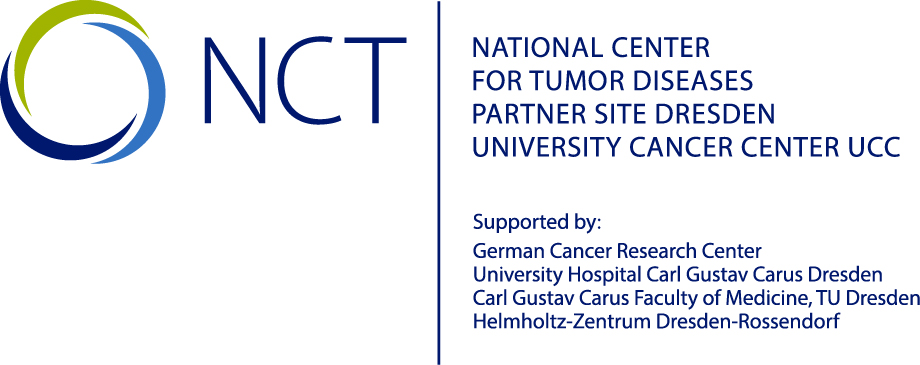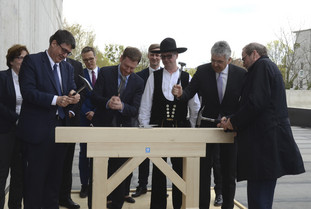Operating room of the future provides new perspectives in cancer surgery • Building concept focuses on close integration of research and patient care • Free State invests 22 million euros in research building • Foundation of Beatrix and Heinz-Jürgen Preiss-Daimler lays the groundwork for additional floor • Hanno Glimm, new professor at the NCT Dresden, uses genetic modifications of cancer cells for therapeutic approaches
Only eleven months after laying down the foundation stone, the topping-out ceremony for the new building of the National Center for Tumor Diseases (NCT) Dresden on the premises of the University Hospital Carl Gustav Carus will be celebrated today, Friday (April 13). With Saxony's Prime Minister Michael Kretschmer in attendance, the topping-out crown will be placed on the unique research platform, which houses the operating theatre of the future in addition to laboratories, areas for patient studies, rooms for cancer treatment and a radiotherapy facility. The Free State of Saxony is providing 22 million euros for the construction of the building. The operating costs for the NCT Dresden, which will amount to 15 million annually starting in 2019, will be borne 90 percent by the federal government and ten percent by the state. The new building will go into operation in 2020.
The topping-out ceremony marks the completion of structural work for the three-story building. In this ultra-modern building, the NCT will integrate cancer research with the treatment of cancer patients. This is the goal of the NCT partner location Dresden, which includes the German Cancer Research Center (DKFZ), the University Hospital Carl Gustav Carus, the Medical Faculty of the TU Dresden and the Helmholtz Zentrum Dresden-Rossendorf (HZDR). Due to its scientific and medical competence, the Saxon state capital was named partner location of the NCT Heidelberg in 2014. Since then both locations have been working closely together and complement each other in their expertise.
With four floors and more than 3,000 square meters of floor space, the new Dresden building will house approximately 200 scientists and researching physicians. With the "operating theatre of the future", a unique research area with digitally networked instruments and devices will allow scientists to obtain important data for the development of computer and robot supported assistance systems for cancer surgery. The operating area will be directly connected to state-of-the-art imaging methods and radiotherapy units, enabling scientists to benefit from one-of-a-kind access to innovative surgical methods. In addition, areas for conducting patient-centered studies in medical oncology as well as a number of technologically highly equipped research laboratories will be constructed.
At the topping-out ceremony, Minister President Michael Kretschmer emphasized: "In national and international comparisons, Saxony is very well positioned in the field of tumor research. The new facility being built in Dresden offers the best environment for top-level patient-oriented research and will enable further advance in the diagnosis and therapy of cancer. With this ambitious project, we will also strengthen Saxony as a center for medicine and science.”
The Federal Minister of Education and Research Anja Karliczek explains: "Cancer is one of the most feared diseases in the population. It is associated with enormous burdens for patients and society. Therefore, it is all the more important that patient treatment and cancer research work hand-in-hand. Medical advances must benefit the patient as quickly as possible. The new NCT building in Dresden, where science and clinic join together, brings us a significant step closer to this goal.
"The new building for the NCT Dresden makes this important institution visible to the outside world and creates an excellent infrastructure for patient-oriented tumor research and the treatment of cancer patients. This will expand the capacities for oncological research on the campus of the Dresden University Medical Center considerably and will directly benefit our patients. They currently benefit from the latest methods for diagnosis and therapy in clinical trials, and in the future, these innovations should be available to all cancer patients," says Prof. Michael Albrecht, Medical Director of the University Hospital Dresden.
Prof. Michael Baumann, Chairman and Scientific Director of the DKFZ: "We see personalized oncology as a real revolution in the fight against cancer. This means that in the future, therapy and diagnostics based on the biological characteristics of the respective tumor will be customized much more specifically to the individual cancer patient than is currently possible. Groundbreaking research in this field will be conducted in the NCT building in Dresden, in close cooperation with Heidelberg.
Prof. Roland Sauerbrey, Scientific Director of the Helmholtz-Zentrum Dresden-Rossendorf: "The NCT Dresden provides an opportunity to further expand the strong cooperation with our Helmholtz colleagues from the German Cancer Research Center and with our local partners at the TU Dresden and the University Hospital. This includes, for example, our research in the fields of proton and immunotherapy or the development of new radioactive drugs for the diagnosis and treatment of tumors.
Molecular physician Hanno Glimm is deciphering the tumor code
With the appointment of Prof. Hanno Glimm on March 1, 2018, another professorship at the NCT Dresden has been filled. The hematologist and internal medicine oncologist holds the professorship of "Translational Medical Oncology" and researches the molecular and cellular mechanisms behind the growth and metastasis of tumors. By analyzing the genetic alterations in tumor cells, for example by decoding tumor DNA, Prof. Glimm is looking for new approaches in customized therapies when conventional treatments are not effective.
"For many types of cancer there are already well-researched therapeutic approaches with high chances of recovery," he explains. "However, if the tumor has already spread and conventional treatment is not very effective, or if there are only a few treatment options available, as for example with some particularly rare tumors, the cancer cell genome can provide indications for further therapeutic approaches.” In concrete terms, Prof. Glimm and his team work to identify specific gene alterations and cell types that are responsible for the development and rapid growth of tumors. "In contrast to healthy cells, cancer cells demonstrate abnormal activity and structure," said the hematologist and internal oncologist. DNA, which carries genetic information, and RNA, which provides the blueprint for important molecules in the cell, determine cell activity and structure. "Our goal is to identify cancer-causing mechanisms that can be combatted with drugs." Prof. Glimm was previously in charge of the innovative genetic tumor analysis project at the NCT Heidelberg and is currently working to expand the program in Dresden. The two locations will work closely together in a joint NCT MASTER Tumor Board, allowing physicians and scientists from Heidelberg and Dresden to consult with one another on the treatment of their patients. As a result, patients at both sites will benefit from the combined expertise of the NCT.
Seeking donors and contributors for the completion of the third floor
The structural work for the third floor of the NCT building has been completed, however, further donations will be necessary to make it operational. This floor would provide space for 65 scientists and, as an interdisciplinary platform, would form an ideal infrastructure for a technology and IT development laboratory. At the time of the topping-out ceremony, more than 720,000 euros had already been raised in the form of donations. The Beatrix and Heinz-Jürgen Preiss-Daimler "Medical Equipment and Research" foundation was very generous in contributing 600,000 euros to the project. Further funding has been raised through events such as the University Medicine Gala, corporate donations and campaigns such as "Donate your deposit!" in cooperation with Dresden Airport and "The Green Point". Additional events such as charity concerts and sporting events will be planned in the future to raise the remaining funds needed to complete the additional floor.
Press Contact:
National Center for Tumor Diseases (NCT) Dresden
Dr. Anna Kraft, Press and public relations work
Phone: +49 (0)351 458-7440
E-Mail: anna.kraft(at)nct-dresden.de
www.nct-dresden.de
Medizinische Fakultät Carl Gustav Carus der TU Dresden
Stephan Wiegand, Stabsstelle Öffentlichkeitsarbeit und Marketing
Tel.: +49 (0) 351 458-5486
Fax: +49 (0) 351 458-885486
E-Mail: stephan.wiegand(at)tu-dresden.de
Internet: www.tu-dresden.de/med/
Universitätsklinikum Carl Gustav Carus Dresden
Holger Ostermeyer, Pressesprecher
Tel.: +49 (0)351 458-4162 | +49 162 255 08 99
Fax: +49 (0)351 449210505
E-Mail: pressestelle(at)uniklinikum-dresden.de
www.uniklinikum-dresden.de
Helmholtz-Zentrum Dresden-Rossendorf (HZDR)
Dr. Christine Bohnet, Kommunikation und Medien | Leiterin
Tel.: +49 351 260-2450 | +49 160 969 288 56
Fax: +49 351 260-2700
E-Mail: c.bohnet(at)hzdr.de
www.hzdr.de
Deutsches Krebsforschungszentrum (DKFZ)
Dr. Sybille Kohlstädt, Presse- und Öffentlichkeitsarbeit
Tel.: +49 6221 42-2843
Fax: +49 6221 42-2968
E-Mail: s.koehlstaedt(at)dkfz.de
www.dkfz.de







